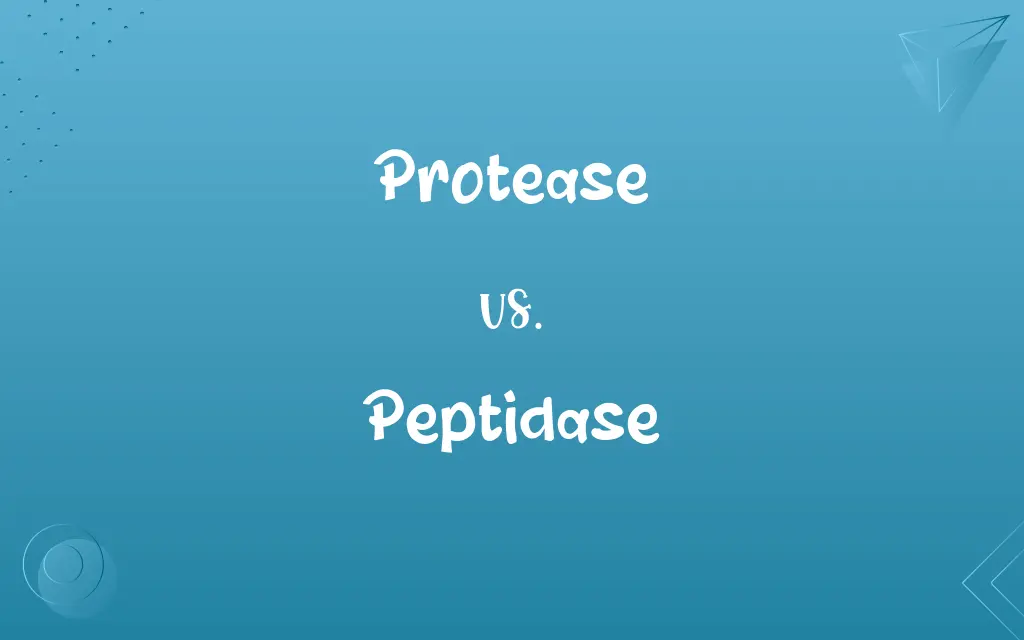Protease vs. Peptidase: Know the Difference

By Shumaila Saeed || Updated on December 25, 2023
Proteases break down proteins into smaller peptides or amino acids, while peptidases specifically cleave peptide bonds within peptides.

Key Differences
Proteases are enzymes that catalyze the breakdown of proteins into smaller peptides or amino acids. Peptidases, a subset of proteases, specifically cleave peptide bonds within peptides, further breaking them down.
Shumaila Saeed
Dec 05, 2023
Proteases act on a wide range of protein substrates, displaying broad specificity. Peptidases, on the other hand, show more specificity by targeting shorter peptide chains.
Shumaila Saeed
Dec 05, 2023
Both proteases and peptidases are classified based on their catalytic mechanism. Proteases include serine, threonine, cysteine, aspartic, and metalloproteases, while peptidases are often categorized within these classes but are defined by their peptide-specific action.
Shumaila Saeed
Dec 05, 2023
Proteases play crucial roles in numerous biological processes like digestion and cell signaling. Peptidases, while also involved in these processes, often have more specialized roles in peptide regulation and metabolism.
Shumaila Saeed
Dec 05, 2023
In medical and industrial applications, proteases have broader uses in drug development and food processing, whereas peptidases are often employed for their specific actions in peptide modification and analysis.
Shumaila Saeed
Dec 05, 2023
ADVERTISEMENT
Comparison Chart
Substrate Specificity
Broad, breaks down proteins
Specific, targets peptide bonds
Shumaila Saeed
Dec 05, 2023
Biological Role
Involved in digestion, cell signaling
Specialized in peptide regulation
Shumaila Saeed
Dec 05, 2023
Types
Includes serine, cysteine, aspartic proteases
Often a subset of broader protease classes
Shumaila Saeed
Dec 05, 2023
Function in Metabolism
Essential for protein metabolism
Key in specific peptide modifications
Shumaila Saeed
Dec 05, 2023
Industrial Applications
Used in pharmaceuticals, food processing
Employed in peptide analysis, modification
Shumaila Saeed
Dec 05, 2023
ADVERTISEMENT
Protease and Peptidase Definitions
Protease
A protease is an enzyme that catalyzes the breakdown of proteins.
The protease in the detergent helps to remove protein stains from clothes.
Shumaila Saeed
Nov 24, 2023
Peptidase
Peptidase refers to enzymes that catalyze the hydrolysis of peptide bonds.
The peptidase in the gut helps in the final stages of protein digestion.
Shumaila Saeed
Nov 24, 2023
Protease
Protease, a biological molecule, plays a role in protein turnover.
Protease activity is vital for cellular protein regulation.
Shumaila Saeed
Nov 24, 2023
Peptidase
A peptidase is a proteolytic enzyme that specifically targets peptides.
Researchers are studying a specific peptidase for its therapeutic potential.
Shumaila Saeed
Nov 24, 2023
Protease
Protease refers to any enzyme that performs proteolysis, protein catabolism.
In digestion, protease breaks down dietary proteins into amino acids.
Shumaila Saeed
Nov 24, 2023
ADVERTISEMENT
Peptidase
Peptidase is involved in peptide metabolism and regulation.
A malfunctioning peptidase can lead to metabolic disorders.
Shumaila Saeed
Nov 24, 2023
Protease
A protease is a type of hydrolase enzyme that cleaves peptide bonds.
HIV protease inhibitors are crucial in AIDS treatment.
Shumaila Saeed
Nov 24, 2023
Peptidase
Peptidase, a hydrolase enzyme, acts on peptide substrates.
Some peptidases are used to produce specific flavors in cheese.
Shumaila Saeed
Nov 24, 2023
Protease
Protease is an enzyme that hydrolyzes proteins into peptides.
Pineapple contains bromelain, a type of protease, aiding digestion.
Shumaila Saeed
Nov 24, 2023
Peptidase
A peptidase is an enzyme that breaks down peptides into amino acids.
Dipeptidase, a type of peptidase, is essential for protein digestion.
Shumaila Saeed
Nov 24, 2023
Protease
Any of various enzymes, including the endopeptidases and exopeptidases, that catalyze the hydrolytic breakdown of proteins. Also called peptidase.
Shumaila Saeed
Oct 19, 2023
Peptidase
(enzyme) Any enzyme that catalyzes the hydrolysis of peptides into amino acids; a protease.
Shumaila Saeed
Oct 19, 2023
Protease
Any enzyme that catalyzes the splitting of proteins into smaller peptide fractions and amino acids by a process known as proteolysis
Shumaila Saeed
Oct 19, 2023
Peptidase
Any enzyme that catalyzes the splitting of proteins into smaller peptide fractions and amino acids by a process known as proteolysis
Shumaila Saeed
Oct 19, 2023
Repeatedly Asked Queries
What are peptidases?
Enzymes that specifically cleave peptide bonds within peptides.
Shumaila Saeed
Dec 05, 2023
How do proteases function?
By catalyzing the hydrolysis of protein substrates.
Shumaila Saeed
Dec 05, 2023
How do peptidases function?
By targeting and breaking peptide bonds in smaller peptides.
Shumaila Saeed
Dec 05, 2023
Can all proteases be considered peptidases?
No, only those that specifically act on peptide bonds.
Shumaila Saeed
Dec 05, 2023
What roles do proteases play in the body?
They're essential for digestion, cell signaling, and immune response.
Shumaila Saeed
Dec 05, 2023
What roles do peptidases play in the body?
Specialized in peptide processing and regulation.
Shumaila Saeed
Dec 05, 2023
Are peptidases used in medicine?
Yes, especially in targeted therapies and diagnostics.
Shumaila Saeed
Dec 05, 2023
What are proteases?
Enzymes that break down proteins into peptides or amino acids.
Shumaila Saeed
Dec 05, 2023
Where are peptidases found?
In various tissues and cells, often alongside proteases.
Shumaila Saeed
Dec 05, 2023
Do proteases have industrial applications?
Yes, in food processing, detergents, and leather making.
Shumaila Saeed
Dec 05, 2023
Do peptidases have industrial applications?
Yes, in specific peptide synthesis and analysis.
Shumaila Saeed
Dec 05, 2023
Are all peptidases proteases?
Yes, peptidases are a specific type of protease.
Shumaila Saeed
Dec 05, 2023
How are peptidases classified?
Often as a subset of proteases based on their peptide specificity.
Shumaila Saeed
Dec 05, 2023
Are proteases used in medicine?
Yes, for treatments and as targets in drug development.
Shumaila Saeed
Dec 05, 2023
Do proteases have any adverse effects?
If unregulated, they can lead to tissue damage and diseases.
Shumaila Saeed
Dec 05, 2023
Can protease activity be regulated?
Yes, through inhibitors and specific physiological conditions.
Shumaila Saeed
Dec 05, 2023
Can peptidase activity be regulated?
Yes, similarly through specific inhibitors and cellular controls.
Shumaila Saeed
Dec 05, 2023
Do peptidases have any adverse effects?
Unregulated activity can disrupt normal peptide metabolism.
Shumaila Saeed
Dec 05, 2023
Share this page
Link for your blog / website
HTML
Link to share via messenger
About Author
Written by
Shumaila SaeedShumaila Saeed, an expert content creator with 6 years of experience, specializes in distilling complex topics into easily digestible comparisons, shining a light on the nuances that both inform and educate readers with clarity and accuracy.








































































